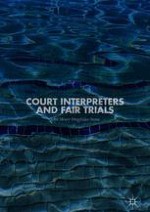2018 | OriginalPaper | Buchkapitel
2. The Right to an Interpreter
verfasst von : John Henry Dingfelder Stone
Erschienen in: Court Interpreters and Fair Trials
Aktivieren Sie unsere intelligente Suche, um passende Fachinhalte oder Patente zu finden.
Wählen Sie Textabschnitte aus um mit Künstlicher Intelligenz passenden Patente zu finden. powered by
Markieren Sie Textabschnitte, um KI-gestützt weitere passende Inhalte zu finden. powered by
